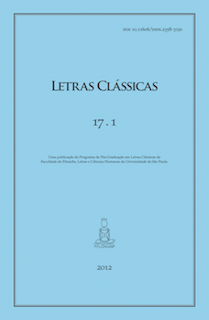The First Imperial Crisis and the intellectuals in the Age of Nero
DOI:
https://doi.org/10.11606/issn.2358-3150.v17i1p34-41Keywords:
Nero, crise, intelectual, Sêneca, Lucano, PérsioAbstract
Under Nero Roman society faced the First Imperial Crisis: the consequence of an unprecedented power and welfare, which was mainly due to the lack of clear political and cultural guidelines after Augustus’ death. Instead of convenientia, or πρέπον, intellectuals privileged novitas and exhibitionism, thereby creating the poetics of the awesome. The more the imperial power went assuming absolutistic and despotic connotations, the less the intellectual’s social role and contribution seemed to be worthy of consideration. Therefore, intellectuals suggested a new concept of the man of letters. They focused on the psychological aspects of the human behavior, as in Seneca’s case. The possible alternative, consciously adopted by Lucan in Pharsalia, was to commit oneself to a macabre and slander gender of poetry: the expression of a common condition of mind weakness. In this regard, Lucan’s stylistic solutions are worth of consideration: via his modus scribendi ardens and concitatus, Lucan expressed his tragic view of reality and diverted from the Roman literary tradition, which lent little space to irrationality. Under Nero there was a revival of philosophical interests, but the traditional philosophies looked not to be any more believable. The persistence of crisis led intellectuals first to passively accept the status quo, then to proudly estrange from the public scenes. With reference to this, Persius’ hexameters in Satirae are highly emblematic.Downloads
Download data is not yet available.
Downloads
Published
2013-06-27
Issue
Section
Artigos
License
Autores que publicam nesta revista concordam com os seguintes termos:
- Autores mantém os direitos autorais e concedem à revista o direito de primeira publicação, com o trabalho licenciado simultaneamente sob uma Licença Creative Commons Attribution 2 anos após a publicação, permitindo o compartilhamento do trabalho com reconhecimento da autoria do trabalho e publicação inicial nesta revista.
- Autores têm autorização para assumir contratos adicionais separadamente, para distribuição não-exclusiva da versão do trabalho publicada nesta revista (ex.: publicar em repositório institucional ou como capítulo de livro), com reconhecimento de autoria e publicação inicial nesta revista.
- Autores têm permissão e são estimulados a publicar e distribuir seu trabalho online (ex.: em repositórios institucionais ou na sua página pessoal) a qualquer ponto antes ou durante o processo editorial, já que isso pode gerar alterações produtivas, bem como aumentar o impacto e a citação do trabalho publicado (Veja O Efeito do Acesso Livre).
How to Cite
The First Imperial Crisis and the intellectuals in the Age of Nero. (2013). Letras Clássicas, 17(1), 34-41. https://doi.org/10.11606/issn.2358-3150.v17i1p34-41


